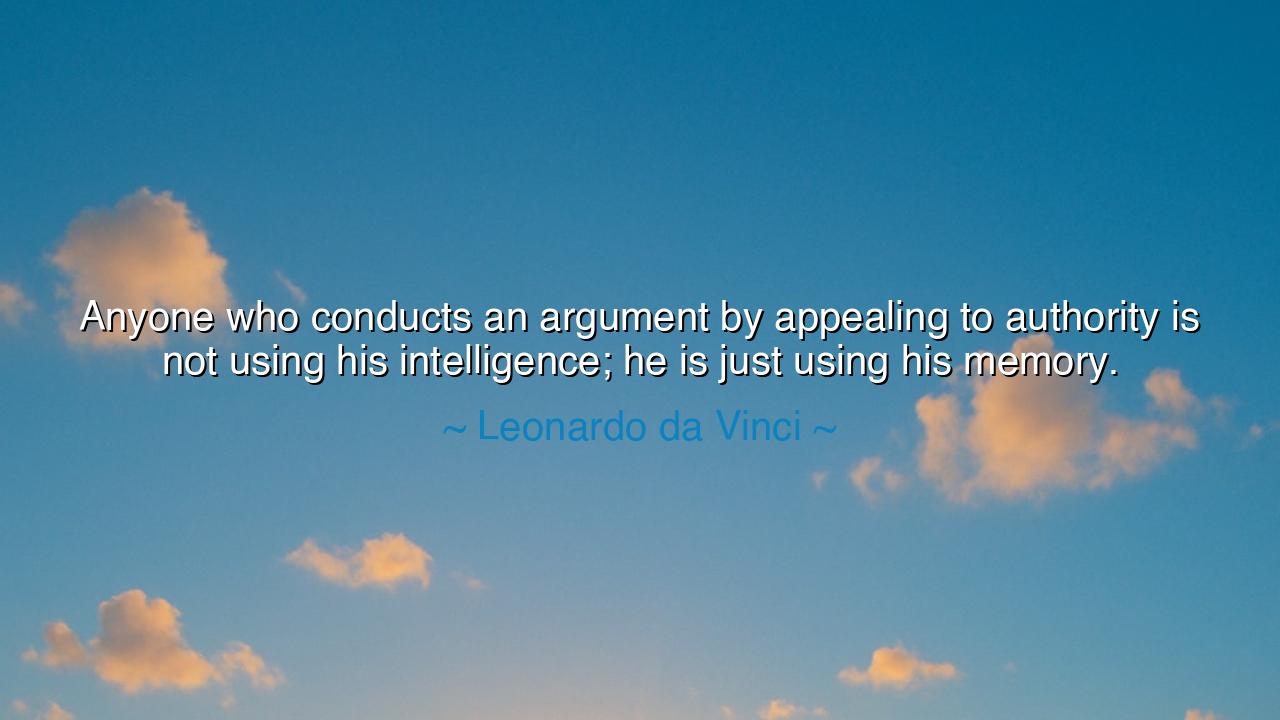
Anyone who conducts an argument by appealing to authority is not
Anyone who conducts an argument by appealing to authority is not using his intelligence; he is just using his memory.






When Leonardo da Vinci wrote, “Anyone who conducts an argument by appealing to authority is not using his intelligence; he is just using his memory,” he was not merely criticizing a way of speaking — he was challenging a way of thinking. His words cut through time like a blade, warning us against the greatest prison of the human mind: blind obedience to the wisdom of others. In this single sentence, he called humanity not to worship knowledge, but to understand it; not to repeat truths, but to discover them. For Leonardo, true intelligence was not the ability to remember what others had said — it was the courage to see for oneself.
The origin of this quote lies in the fiery spirit of the Renaissance, an age when old dogmas were being questioned and the light of human reason was beginning to pierce the darkness of unquestioned tradition. Leonardo lived in a world still bound by the authority of scholars, priests, and kings — where truth was often dictated by power rather than proven by observation. But he, a man of unbounded curiosity, saw through the illusion. He studied the flight of birds, the anatomy of bodies, the motion of water and stars — not because a book told him to, but because the world itself was his teacher. His words remind us that truth must be earned through experience, not inherited through memory.
To appeal to authority, he says, is not to think, but to recite. It is to replace the living flame of reason with the ashes of imitation. Many who seem wise are merely echoes of others — filled with facts, but empty of understanding. Leonardo saw that knowledge without thought is like a mirror that reflects light without warmth. The truly intelligent mind, he believed, questions even the greatest masters, for wisdom is not a monument but a river — ever moving, ever renewing. To worship authority is to freeze that river, to trade curiosity for comfort, and to let the soul grow still in borrowed certainty.
History is filled with examples of how blind faith in authority has stifled truth. In the ancient world, Aristotle taught that heavier objects fall faster than lighter ones, and for nearly two thousand years, no one dared to question him. Then came Galileo, who, climbing the tower of Pisa, dropped two stones of different weights and watched them strike the ground together. In that moment, he did more than prove a law of physics — he proved a law of wisdom: that the human mind must never surrender its intelligence to the authority of memory. Leonardo’s words echo the same rebellion — a call to every generation to rise above repetition and dare to see with their own eyes.
Yet Leonardo’s warning is not one of arrogance, but of liberation. He does not reject the wisdom of others; he rejects submission to it. He teaches us to learn from the masters, but not to become their slaves. For even the greatest minds, he knew, were but travelers on the same road of discovery. To think is not to deny what others have said, but to test it, to weigh it against the evidence of life itself. Intelligence, he says, is not a library — it is a forge, where the sparks of curiosity ignite the steel of truth. Memory preserves the past, but intelligence creates the future.
Consider Leonardo himself: the painter who studied anatomy to paint truth into flesh; the engineer who designed flying machines centuries before flight; the thinker who saw in nature a pattern that no book had yet described. He honored knowledge but refused to be confined by it. When he looked at the human body, he did not quote Galen or Aristotle — he dissected. When he watched birds, he did not cite philosophers — he observed. His life was a living refutation of his own warning: that to appeal to authority is to renounce the very power that makes us human — the divine spark of reason.
So, my child, take this lesson as a torch for your own journey. Do not let your intelligence be chained by tradition or title. Listen to the wise, but question them. Learn from books, but verify with life. Respect authority, but never kneel before it. For the greatest discoveries — in science, in art, in the soul — are made not by those who remember best, but by those who wonder most. As Leonardo da Vinci teaches, the true use of knowledge is not to repeat it, but to transform it. Let your mind be alive, your curiosity fierce, your courage unwavering — and in doing so, you will not merely remember truth, but become its living witness.






AAdministratorAdministrator
Welcome, honored guests. Please leave a comment, we will respond soon